《经贸英语阅读与翻译》
- 格式:doc
- 大小:74.00 KB
- 文档页数:29

湖南应用技术学院商务英语阅读教程教学大纲、外国语学院《商务英语阅读教程(三)》教学大纲课程代码:02 开课学期:第二学年第一学期适用专业:商务英语专业学时:32编写教师:学分:2审核:陈勇、郭俊兰、张霞辉审批:陈勇第一部分说明一、课程的性质、作用本课程是为商务英语专业开设的必修课程。
本课程的作用在于传授学生有关的阅读与技巧,提升学生的商务英语阅读水平与理解能力,扩大阅读词汇,增加英语国家文化背景知识,为学生参加专业四、八级考试及其他形式的英语考试奠定良好的基础。
学生通过有目的、较系统地阅读英语国家纸媒和网媒的精选文章,逐渐掌握泛读的基本技巧,了解一些英美国家的历史、文化、地理、政治、军事、法律、经济、金融、体育、经贸、环保、能源等方面的基本知识。
从而为学生独立阅读各种商务英语文章打下良好的基础。
二、课程的任务与基本要求本课程的任务是提高阅读速度,强调阅读速度与理解能力并重;掌握文章体裁、风格及相应的阅读方法;扩大词汇量,掌握基本句式,较能通顺的翻译句子和段落;较熟练地概括文章段落大意,培养较强的文章分就析归纳能力;较全面的了解英语国家政治、经济、文化、科技等方面的知识;增加英语国家背景知识,增强跨文化交际能力。
本课程重点讲述商务英语阅读的基本原理、阅读技巧和实践方法,侧重于英语学习者语言综合知识的运用。
因而,在本课程的教学过程中,必须使学生真正透彻地领会诸如阅读的过程、图式理论、构词法、猜词技巧、句子与句子的关系、话题与话题句、要旨、推理与判断、文体与风格等阅读理论内涵;要注重阅读理论与阅读实践的紧密结合,处理好阅读速度与理解之间的关系,避免知识的重复和脱节,从而使学生能够得到比较系统而全面的英语阅读基本技能。
三、教学方法建议针对阅读课教学的自身特点,课堂教学应贯穿以学生为主体、教师为主导的教学模式。
在讲解阅读技巧的同时应辅以大量的阅读实践,在大量的阅读过程中体会并掌握各种阅读方法,达到逐渐提高阅读理解能力与阅读速度的目的。
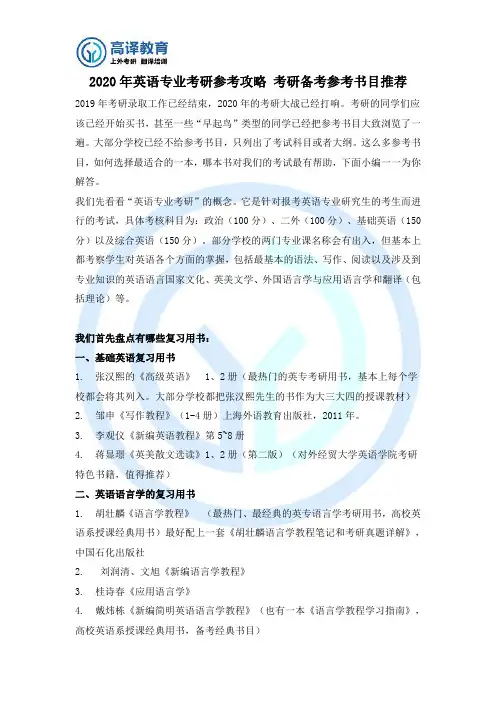
2020年英语专业考研参考攻略考研备考参考书目推荐2019年考研录取工作已经结束,2020年的考研大战已经打响。
考研的同学们应该已经开始买书,甚至一些“早起鸟”类型的同学已经把参考书目大致浏览了一遍。
大部分学校已经不给参考书目,只列出了考试科目或者大纲。
这么多参考书目,如何选择最适合的一本,哪本书对我们的考试最有帮助,下面小编一一为你解答。
我们先看看“英语专业考研”的概念。
它是针对报考英语专业研究生的考生而进行的考试,具体考核科目为:政治(100分)、二外(100分)、基础英语(150分)以及综合英语(150分)。
部分学校的两门专业课名称会有出入,但基本上都考察学生对英语各个方面的掌握,包括最基本的语法、写作、阅读以及涉及到专业知识的英语语言国家文化、英美文学、外国语言学与应用语言学和翻译(包括理论)等。
我们首先盘点有哪些复习用书:一、基础英语复习用书1.张汉熙的《高级英语》1、2册(最热门的英专考研用书,基本上每个学校都会将其列入。
大部分学校都把张汉熙先生的书作为大三大四的授课教材)2.邹申《写作教程》(1-4册)上海外语教育出版社,2011年。
3.李观仪《新编英语教程》第5~8册4.蒋显璟《英美散文选读》1、2册(第二版)(对外经贸大学英语学院考研特色书籍,值得推荐)二、英语语言学的复习用书1.胡壮麟《语言学教程》(最热门、最经典的英专语言学考研用书,高校英语系授课经典用书)最好配上一套《胡壮麟语言学教程笔记和考研真题详解》,中国石化出版社2.刘润清、文旭《新编语言学教程》3.桂诗春《应用语言学》4.戴炜栋《新编简明英语语言学教程》(也有一本《语言学教程学习指南》,高校英语系授课经典用书,备考经典书目)5.蓝纯《语言导论》6.杨信彰《语言学概论》三、英美文学的复习用书1.罗经国《新编英国文学选读》2.《英国文学简史:学习指南》(常耀信版《英国文学简史》配套辅导),赵红英编,西南交通大学出版社.(经典参考书目)3.《美国文学简史:学习指南(第3版)》配套南开大学常耀信版,赵红英编,西南交通大学出版社.(经典参考书目)4.张伯香《英美文学选读》、《英国文学教程》5.陈嘉《英国文学史》6.杨岂深《英国文学选读》7.《英国文学史概述及作品选读》、《美国文学史概述及作品选读》,刘洊波主编,高等教育出版社,2010年3月。
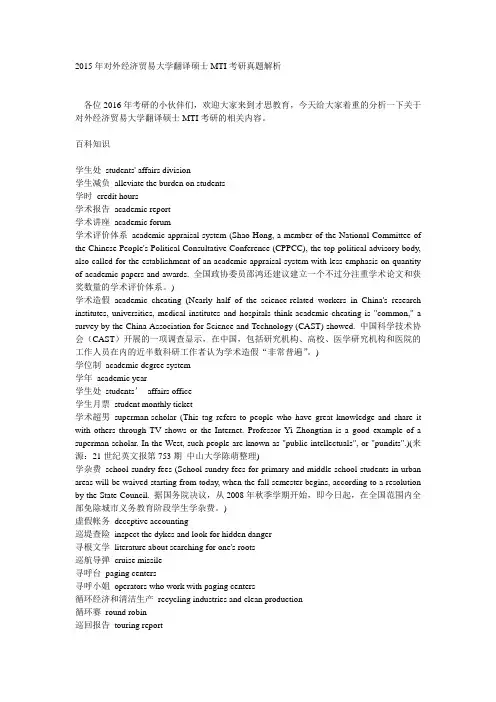
2015年对外经济贸易大学翻译硕士MTI考研真题解析各位2016年考研的小伙伴们,欢迎大家来到才思教育,今天给大家着重的分析一下关于对外经济贸易大学翻译硕士MTI考研的相关内容。
百科知识学生处students' affairs division学生减负alleviate the burden on students学时credit hours学术报告academic report学术讲座academic forum学术评价体系academic appraisal system (Shao Hong, a member of the National Committee of the Chinese People's Political Consultative Conference (CPPCC), the top political advisory body, also called for the establishment of an academic appraisal system with less emphasis on quantity of academic papers and awards. 全国政协委员邵鸿还建议建立一个不过分注重学术论文和获奖数量的学术评价体系。
)学术造假academic cheating (Nearly half of the science-related workers in China's research institutes, universities, medical institutes and hospitals think academic cheating is "common," a survey by the China Association for Science and Technology (CAST) showed. 中国科学技术协会(CAST)开展的一项调查显示,在中国,包括研究机构、高校、医学研究机构和医院的工作人员在内的近半数科研工作者认为学术造假“非常普遍”。

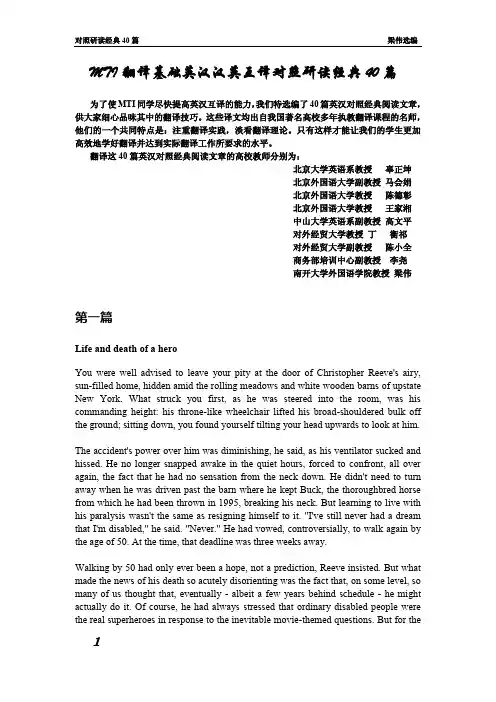
MTI翻译基础英汉汉英互译对照研读经典40篇为了使MTI同学尽快提高英汉互译的能力,我们特选编了40篇英汉对照经典阅读文章,供大家细心品味其中的翻译技巧。
这些译文均出自我国著名高校多年执教翻译课程的名师,他们的一个共同特点是:注重翻译实践,淡看翻译理论。
只有这样才能让我们的学生更加高效地学好翻译并达到实际翻译工作所要求的水平。
翻译这40篇英汉对照经典阅读文章的高校教师分别为:北京大学英语系教授辜正坤北京外国语大学副教授马会娟北京外国语大学教授陈德彰北京外国语大学教授王家湘中山大学英语系副教授高文平对外经贸大学教授丁衡祁对外经贸大学副教授陈小全商务部培训中心副教授李尧南开大学外国语学院教授梁伟第一篇Life and death of a heroYou were well advised to leave your pity at the door of Christopher Reeve's airy, sun-filled home, hidden amid the rolling meadows and white wooden barns of upstate New York. What struck you first, as he was steered into the room, was his commanding height: his throne-like wheelchair lifted his broad-shouldered bulk off the ground; sitting down, you found yourself tilting your head upwards to look at him.The accident's power over him was diminishing, he said, as his ventilator sucked and hissed. He no longer snapped awake in the quiet hours, forced to confront, all over again, the fact that he had no sensation from the neck down. He didn't need to turn away when he was driven past the barn where he kept Buck, the thoroughbred horse from which he had been thrown in 1995, breaking his neck. But learning to live with his paralysis wasn't the same as resigning himself to it. "I've still never had a dream that I'm disabled," he said. "Never." He had vowed, controversially, to walk again by the age of 50. At the time, that deadline was three weeks away.Walking by 50 had only ever been a hope, not a prediction, Reeve insisted. But what made the news of his death so acutely disorienting was the fact that, on some level, so many of us thought that, eventually - albeit a few years behind schedule - he might actually do it. Of course, he had always stressed that ordinary disabled people were the real superheroes in response to the inevitable movie-themed questions. But for therest of us, the personal narrative was too seductive to resist: Superman, brought down to earth, ultimately triumphs again through sheer force of will. ―――――――――――――――――――――――――――――――――――――――――――――英雄的生与死你最好把怜悯丢在克里斯托弗•里夫通风良好、充满阳光的家门外。
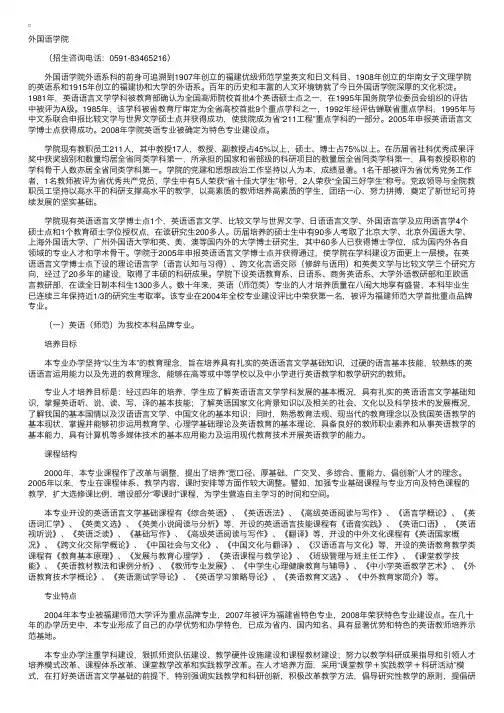
外国语学院 (招⽣咨询电话:0591-********) 外国语学院外语系科的前⾝可追溯到1907年创⽴的福建优级师范学堂英⽂和⽇⽂科⽬、1908年创⽴的华南⼥⼦⽂理学院的英语系和1915年创⽴的福建协和⼤学的外语系。
百年的历史和丰富的⼈⽂环境铸就了今⽇外国语学院深厚的⽂化积淀。
1981年,英语语⾔⽂学学科被教育部确认为全国⾼师院校⾸批4个英语硕⼠点之⼀,在1995年国务院学位委员会组织的评估中被评为A级。
1985年,该学科被省教育厅审定为全省⾼校⾸批9个重点学科之⼀,1992年经评估蝉联省重点学科,1995年与中⽂系联合申报⽐较⽂学与世界⽂学硕⼠点并获得成功,使我院成为省“211⼯程”重点学科的⼀部分。
2005年申报英语语⾔⽂学博⼠点获得成功。
2008年学院英语专业被确定为特⾊专业建设点。
学院现有教职员⼯211⼈,其中教授17⼈,教授、副教授占45%以上,硕⼠、博⼠占75%以上。
在历届省社科优秀成果评奖中获奖级别和数量均居全省同类学科第⼀,所承担的国家和省部级的科研项⽬的数量居全省同类学科第⼀,具有教授职称的学科⾻⼲⼈数亦居全省同类学科第⼀。
学院的党建和思想政治⼯作坚持以⼈为本,成绩显著。
1名⼲部被评为省优秀党务⼯作者,1名教师被评为省优秀共产党员,学⽣中有5⼈荣获“省⼗佳⼤学⽣”称号,2⼈荣获“全国三好学⽣”称号。
党政领导与全院教职员⼯坚持以⾼⽔平的科研⽀撑⾼⽔平的教学,以⾼素质的教师培养⾼素质的学⽣,团结⼀⼼,努⼒拼搏,奠定了新世纪可持续发展的坚实基础。
学院现有英语语⾔⽂学博⼠点1个,英语语⾔⽂学、⽐较⽂学与世界⽂学、⽇语语⾔⽂学、外国语⾔学及应⽤语⾔学4个硕⼠点和1个教育硕⼠学位授权点,在读研究⽣200多⼈。
历届培养的硕⼠⽣中有90多⼈考取了北京⼤学、北京外国语⼤学、上海外国语⼤学、⼴州外国语⼤学和英、美、澳等国内外的⼤学博⼠研究⽣,其中60多⼈已获得博⼠学位,成为国内外各⾃领域的专业⼈才和学术⾻⼲。
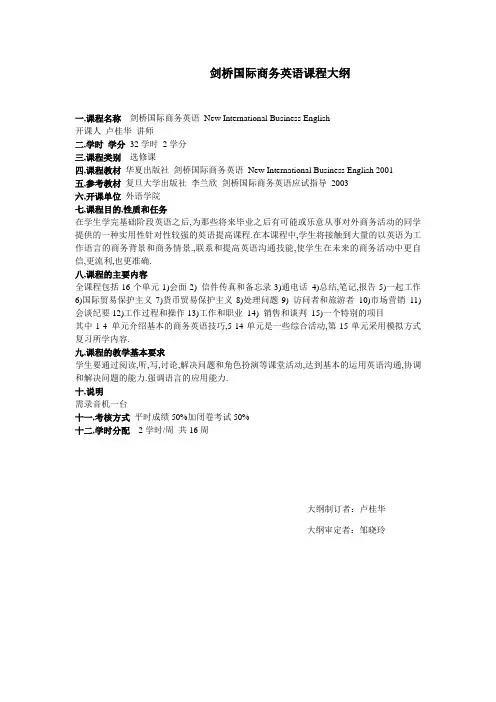
剑桥国际商务英语课程大纲一,课程名称剑桥国际商务英语New International Business English开课人卢桂华讲师二,学时学分32学时2学分三,课程类别选修课四,课程教材华夏出版社剑桥国际商务英语New International Business English 2001五,参考教材复旦大学出版社李兰欣剑桥国际商务英语应试指导2003六,开课单位外语学院七,课程目的,性质和任务在学生学完基础阶段英语之后,为那些将来毕业之后有可能或乐意从事对外商务活动的同学提供的一种实用性针对性较强的英语提高课程.在本课程中,学生将接触到大量的以英语为工作语言的商务背景和商务情景.,联系和提高英语沟通技能,使学生在未来的商务活动中更自信,更流利,也更准确.八,课程的主要内容全课程包括16个单元1)会面2) 信件传真和备忘录3)通电话4)总结,笔记,报告5)一起工作6)国际贸易保护主义7)货币贸易保护主义8)处理问题9) 访问者和旅游者10)市场营销11)会谈纪要12)工作过程和操作13)工作和职业14) 销售和谈判15)一个特别的项目其中1-4 单元介绍基本的商务英语技巧,5-14单元是一些综合活动,第15单元采用模拟方式复习所学内容.九,课程的教学基本要求学生要通过阅读,听,写,讨论,解决问题和角色扮演等课堂活动,达到基本的运用英语沟通,协调和解决问题的能力.强调语言的应用能力.十,说明需录音机一台十一,考核方式平时成绩50%加闭卷考试50%十二,学时分配2学时/周共16周大纲制订者:卢桂华大纲审定者:邹晓玲剑桥国际商务英语1 课程中文名称剑桥国际商务英语New International Business English开课人卢桂华讲师2 学时学分32学时2学分3 课程类别选修课4 预修课程大学英语5内容简介全课程包括16个单元1)会面2) 信件传真和备忘录3)通电话4)总结,笔记,报告5)一起工作6)国际贸易保护主义7)货币贸易保护主义8)处理问题9) 访问者和旅游者10)市场营销11)会谈纪要12)工作过程和操作13)工作和职业14) 销售和谈判15)一个特别的项目其中1-4 单元介绍基本的商务英语技巧,5-14单元是一些综合活动,第15单元采用模拟方式复习所学内容.学生要通过阅读,听,写,讨论,解决问题和角色扮演等课堂活动,达到基本的运用英语沟通,协调和解决问题的能力.强调语言的应用能力.6 课程教材剑桥国际商务英语New International Business English华夏出版社20017 参考书复旦大学出版社李兰欣剑桥国际商务英语应试指导20038 选课对象已通过英语四级的本科生研究生9 开课单位外语学院商务英语阅读课程教学大纲一、课程名称:《商务英语阅读》(English Readings in International Business)课程负责人:朱万忠二、学时与学分:32学时2学分三、课程类别:文化素质教育选修课四、课程教材:陈苏东,陈建平主编,《商务英语阅读》,北京:高等教育出版社,2002五、参考教材:熊伟编著, 《国际贸易实务英语》,武汉:武汉大学出版社,2001六、开课单位:重庆大学外国语学院七、课程的目的、性质和任务“商务英语阅读”使实用性很强的课程,以西方报刊中报到和论述国际商务的文章为主要内容,集英语语言学习和国际商务知识的传授为一体,通过有指导的阅读和训练,使学生掌握这类文章的文体、语言和内容特点,提高语言理解和欣赏能力,培养学生收集、整理和研究国际商务信息的能力,锻炼其逻辑思维能力,扩大其国际商务背景知识。
![[论文]英文外贸信函中重要同义词的分析和翻译](https://uimg.taocdn.com/2abac9c7ff00bed5b8f31d3b.webp)
[论文]英文外贸信函中重要同义词的分析和翻译英文外贸信函中重要同义词的分析和翻译摘要外贸函电在国际贸易中,使用极为广泛。
可以说,不懂英文函电,就做不成国际贸易。
本文就外贸函电中最重要最常用的两组名词,一组动词和一组术语的同义词进行了分析研究,以期避免双方在沟通和理解上造成误解,确保达成共识,促进贸易发展。
关键词:外贸函电国际贸易同义词分析与翻译中国论文职称论文Abstract International business correspondences play an important role in international trade. With China’s accession to the WTO ,we are confronted with more challenges as well as business opportunities. It is therefore very important for us to have a good command of some important synonyms most commonly used in the international trade. It can be said that without business correspondence , all international trade and business will fall apart . Inthis article , the author gives a detailed analysis of some useful terms and expressions often used in international trade.Key Words international trade communication key words translation外贸函电无论是打印还是手书,一经签发,即产生法律效力并隐含显示了公司或个人的素质和水平。
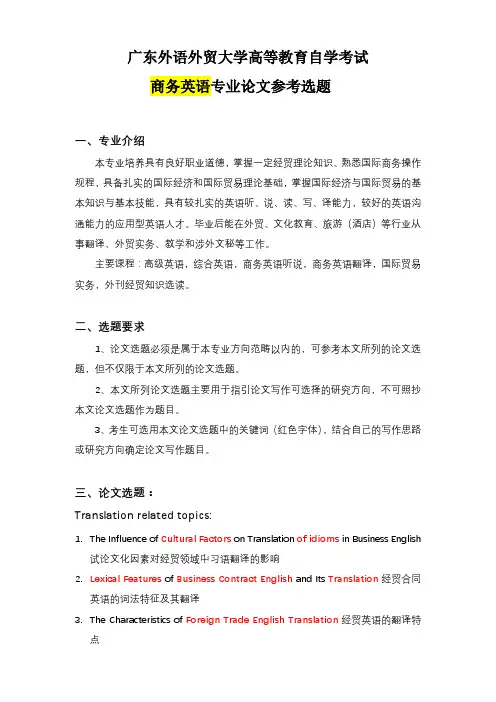
广东外语外贸大学高等教育自学考试商务英语专业论文参考选题一、专业介绍本专业培养具有良好职业道德,掌握一定经贸理论知识、熟悉国际商务操作规程,具备扎实的国际经济和国际贸易理论基础,掌握国际经济与国际贸易的基本知识与基本技能,具有较扎实的英语听、说、读、写、译能力,较好的英语沟通能力的应用型英语人才。
毕业后能在外贸、文化教育、旅游(酒店)等行业从事翻译、外贸实务、教学和涉外文秘等工作。
主要课程:高级英语,综合英语,商务英语听说,商务英语翻译,国际贸易实务,外刊经贸知识选读。
二、选题要求1、论文选题必须是属于本专业方向范畴以内的,可参考本文所列的论文选题,但不仅限于本文所列的论文选题。
2、本文所列论文选题主要用于指引论文写作可选择的研究方向,不可照抄本文论文选题作为题目。
3、考生可选用本文论文选题中的关键词(红色字体),结合自己的写作思路或研究方向确定论文写作题目。
三、论文选题:Translation related topics:1.The Influence of Cultural Factors on Translation of idioms in Business English试论文化因素对经贸领域中习语翻译的影响2.Lexical Features of Business Contract English and Its Translation经贸合同英语的词法特征及其翻译3.The Characteristics of Foreign Trade English Translation经贸英语的翻译特点4.Influence of Contextual factors on Business English Translation经贸英语翻译中语境因素的作用5.On the Translation Criteria of Business English 试论经贸英语翻译的标准6.Understanding and Translation of the Divisional Phenomena in BusinessEnglish Contracts英语经贸契约分隔现象的理解与翻译7.On Abbreviations in Business English谈经贸英语中的缩略语现象8.On the Characteristics of Business English Vocabulary经贸英语的词汇特点9.Diction in Economy and Trade Translation经贸翻译的词义选择10.Multi-discipline motivations of the Business English Vocabulary论商务英语词汇的多学科性11.On the linguistic/ cultural Features of Business English E-mails浅谈商务英语电子邮件的写作特点12.Analysis of the Stylistic Features of the Contract English浅析合同英语的文体特点13.Translation of English Advertisement in Cross-cultural communication跨文化背景中的广告英语翻译14.Translation of Dates, Amount and Numbers in the Business English Contracts浅析商务合同中日期、金额和数字的翻译15.On Translating Strategies of Modern Business English现代商务英语的翻译策略16.On the Principle of Faithfulness in C-E Business Translation浅谈商务英语英汉翻译的"信"原则17.Methods and Principles of Trade Mark Translation商标翻译的方法及应遵循的基本原则18.The Linguistic Characteristics and Translation Strategies of EnglishAdvertisement广告英语的语言特点及翻译策略Linguistic aspects:19.A Study of the syntactic features in English Business Contracts 试谈英语经贸合同的句法特点20.On the Accuracy of Business English Translation浅析商务英语翻译的准确性21.On the Rhetorical Features and Translation strategies of Advertising English浅析广告英语的修辞特点及翻译方法22.Translation of Metaphor in Business English 浅谈商务英语中的隐喻翻译23.On "Faithfulness" and "Innovation" in Business English Translation外贸英语翻译的"忠实"与"变通"24.The Strategies of Domestication and Dissimulation on Advertising EnglishTranslation广告英语翻译的"归化"和""异化"策略25.Cross-cultural Factors i n Advertising English Translation广告英语翻译中的跨文化因素26.On the Rhetoric and Translation Approaches in Advertising English论广告英语的修辞艺术和翻译方法27.The Function of Fuzzy Language in Business English Writing论模糊语言在商务英语写作中的作用28.The Application of Polite Principles in Business English Writing 礼貌原则在商务英语写作中的应用29.On the Preciseness of Business English Contracts论商务英语合同语言的严谨性30.How to Achieve Consideration in Business E-mails如何实现商务电子邮件中的“consideration”31.An Analysis of the Rhetorical Devices in Advertising English广告英语的修辞方法探析32.On the Translation Principles of Trademarks in Business English浅析商务英语中的商标翻译33.On Functions of Business English Abbreviations 浅析商务英语中缩略语的功能34.Influence of Cultural differences on the Translation of Business English文化差异对商务英语翻译的影响35.On the Writing Features of Business English Letters 浅析商务英语信函的写作特点36.On Linguistic features of Business English Correspondence 商务英语信函的语言特征Culture related topics:37.The Influence of Cultural Elements on the Translation of idioms in BusinessEnglish 浅析文化因素对商务英语习语翻译的影响38.A Pragmatic Analysis of Long Sentences in Business English Contracts商务英语合同中的长句语用分析39.The Lexical Features of E-commerce English 电子商务英语的词汇特征分析40.A Study of the Cross-cultural Factors in Business Negotiation 商务谈判中的跨文化因素研究41.Functions of Non-verbal Communication in Business Negotiation 非语言交际在商务谈判中的功能研究42.A Study of Cultural Factors in Sino-American Business Negotiation中美商务谈判中的文化因素研究Business English teaching related topics:43.The Application of Case Study in Business English Teaching案例教学法在商务英语教学中的应用44.The Application of Situated Teaching Theory in Business English Teaching 情境教学理论在商务英语教学中的运用45.On Fostering Communicative Competence in Business English Teaching 试论商务英语教学中语言交际能力的培养46.The Application of Task-based Teaching in Business English Teaching 任务教学法在商务英语教学中的应用47.Cultivation of Cross-cultural Communication competence in BusinessEnglish Teaching 商务英语教学中跨文化交际能力的培养温馨提示:如《英语教育》专业本次以新专业《英语》申请学位,请参考旧专业《英语教育》论文选题。
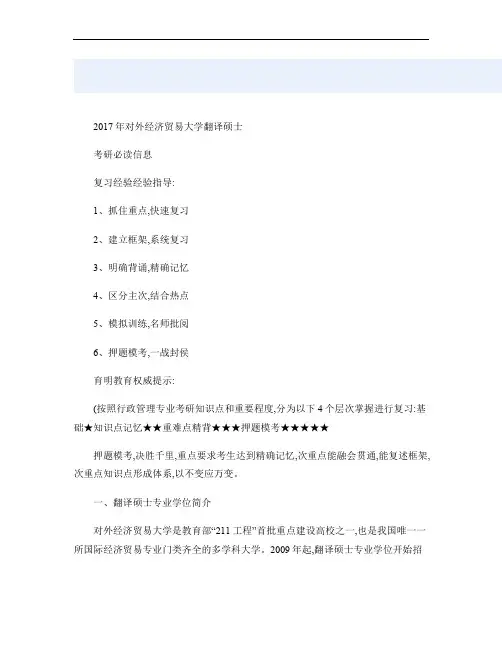
2017年对外经济贸易大学翻译硕士考研必读信息复习经验经验指导:1、抓住重点,快速复习2、建立框架,系统复习3、明确背诵,精确记忆4、区分主次,结合热点5、模拟训练,名师批阅6、押题模考,一战封侯育明教育权威提示:(按照行政管理专业考研知识点和重要程度,分为以下4个层次掌握进行复习:基础★知识点记忆★★重难点精背★★★押题模考★★★★★押题模考,决胜千里,重点要求考生达到精确记忆,次重点能融会贯通,能复述框架,次重点知识点形成体系,以不变应万变。
一、翻译硕士专业学位简介对外经济贸易大学是教育部“211工程”首批重点建设高校之一,也是我国唯一一所国际经济贸易专业门类齐全的多学科大学。
2009年起,翻译硕士专业学位开始招生,已培养出优秀毕业生,就业于外交部、商务部、中联部等各大部委外事部门,以及中外企事业单位和金融机构。
英语学院开展翻译教学已有50多年的历史,曾经拥有张培基、丁衡祁等著名翻译学者,设有翻译系和MTI教育中心,形成了从本科、硕士、博士、留学生等全国8大分校·出题人阅卷人加盟·多对一跟踪督促·精准考研信息·考前绝密押题·复试协议保过高端状元集训营·一对一押题保分·专业课视频课程·全套真题(含解析笔记·专业课押题卷完整的翻译人才培养模式,经贸特色和优势鲜明。
200年与欧盟委员会口译总司合作设立了“中欧高级译员培训中心”,引进了成熟的欧洲译员培训模式培养会议口译员,2004年起招收会议口译硕士研究生,2008年起招收翻译专业本科生,2009年起招收翻译硕士,2011年起招收商务翻译博士研究生,已培养出高素质口笔译毕业生近千人。
我院师资队伍实力雄厚,经贸翻译和口译教学团队在全国享有盛誉。
现有专任翻译教师22人,并聘请林超伦等多位资深专家担任兼职教师。
口译教师均在欧盟口译总司接受过专业培训,并获得欧盟口译证书。
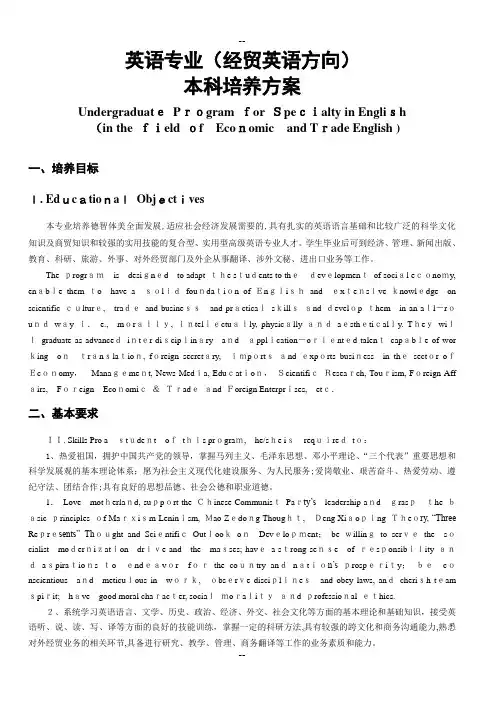
英语专业(经贸英语方向)本科培养方案UndergraduateProgram for Specialty in English(in the field of Economic and Trade English )一、培养目标I. EducationalObjectives本专业培养德智体美全面发展,适应社会经济发展需要的,具有扎实的英语语言基础和比较广泛的科学文化知识及商贸知识和较强的实用技能的复合型、实用型高级英语专业人才。
学生毕业后可到经济、管理、新闻出版、教育、科研、旅游、外事、对外经贸部门及外企从事翻译、涉外文秘、进出口业务等工作。
The programis designed to adapt the students to thedevelopmentof social economy, enable them to have asolidfoundation of Englishandextensive knowledge on scientific culture,tradeand businessand practicalskillsand develop them in an all-roundway i.e.,morally, intellectually, physically andaesthetically. Theywillgraduate as advancedinter-disciplinary andapplication-oriented talentcapable of wor king ontranslation, foreign secretary,importsand exports business in thesector ofEconomy,Management, News Media, Education,ScientificResearch, Tourism, Foreign Aff airs,Foreign Economic&Tradeand Foreign Enterprises,etc.二、基本要求II. Skills Pro astudent ofthis program,he/she isrequiredto:1、热爱祖国,拥护中国共产党的领导,掌握马列主义、毛泽东思想、邓小平理论、“三个代表”重要思想和科学发展观的基本理论体系;愿为社会主义现代化建设服务、为人民服务;爱岗敬业、艰苦奋斗、热爱劳动、遵纪守法、团结合作;具有良好的思想品德、社会公德和职业道德。
江苏省高等教育自学考试秘书学(行政秘书方向)专业(本科)考试计划主考学校:南京审计学院2、独立本科段(专业代码:3050104)注: 1. “X”为学位考试课程; 如有调整,以南京审计学院文件为准。
2. “H”为不考英语者换考课程。
3.本考试计划依据江苏省自考委文件规定,如有调整,以上级新文件规定为准。
江苏省高等教育自学考试金融学(金融与投资管理方向)专业(本科)考试计划(专业代号:3020178)主考学校:南京审计学院1、专科段注: 1. “X”为学位考试课程; 如有调整,以南京审计学院文件为准。
2. “H”为不考英语者换考课程。
3.本考试计划依据江苏省自考委文件规定,如有调整,以上级新文件规定为准。
江苏省高等教育自学考试财税专业(本科)考试计划(专业代号:3020182)主考学校:南京审计学院1、专科段2、独立本科段注: 1. “X”为学位考试课程; 如有调整,以南京审计学院文件为准。
2. “H”为不考英语者换考课程。
3.本考试计划依据江苏省自考委文件规定,如有调整,以上级新文件规定为准。
江苏省高等教育自学考试电子商务物流(本科)考试计划主考学校:南京审计学院1、专科段(专业代码:3020196)2、独立本科段(专业代码:3020197)注: 1. “X”为学位考试课程; 如有调整,以南京审计学院文件为准。
2. “H”为不考英语者换考课程。
3.本考试计划依据江苏省自考委文件规定,如有调整,以上级新文件规定为准。
江苏省高等教育自学考试英语(经贸英语方向)专业(本科)考试计划(专业代号:3050201)主考学校:南京审计学院1、专科段注: 1. “X”为学位考试课程; 如有调整,以南京审计学院文件为准。
2. “H”为不考英语者换考课程。
3.本考试计划依据江苏省自考委文件规定,如有调整,以上级新文件规定为准。
江苏省高等教育自学考试会计(注册会计师方向)专业(本科)考试计划(专业代号:3020204)主考学校:南京审计学院1、专科段注: 1. “X”为学位考试课程; 如有调整,以南京审计学院文件为准。
讨 最《英语阅读(四)》教学 大纲课程代码:0502010108 开课学期:第二学年第二学期适用专业:英语专业 学 时: 36 编写教师: 学 分: 2审 核:李旋旗、郭俊兰、杨华丽第一部分 说 明一、课程的性质、作用本课程是为英语专业开设的必修课程。
本课程的作用在于传授学生有关的阅读与技巧,提升学生的英语阅读水平与理解能力, 扩大阅读词汇,增加英语国家文化背景知识,为学生参加专业四、八级考试及其他形式的英 语考试奠定良好的基础。
学生通过有目的、较系统地阅读英语国家纸媒和网媒的精选文章, 逐渐掌握泛读的基本技巧,了解一些英美国家的历史、文化、地理、政治、军事、法律、经 济、金融、体育、经贸、环保、能源等方面的基本知识。
从而为学生独立阅读各种英语文章 打下良好的基础。
二、课程的任务与基本要求本课程的任务是提高阅读速度,强调阅读速度与理解能力并重;掌握文章体裁、风格及 相应的阅读方法;扩大词汇量,掌握基本句式,较能通顺的翻译句子和段落;较熟练地概括 文章段落大意,培养较强的文章分就析归纳能力;较全面的了解英语国家政治、经济、文化、 科技等方面的知识;增加英语国家背景知识,增强跨文化交际能力。
本课程重点讲述英语阅读的基本原理、阅读技巧和实践方法,侧重于英语学习者语言综合知 识的运用。
因而,在本课程的教学过程中,必须使学生真正透彻地领会诸如阅读的过程、图 式理论、构词法、猜词技巧、句子与句子的关系、话题与话题句、要旨、推理与判断、文体 与风格等阅读理论内涵;要注重阅读理论与阅读实践的紧密结合,处理好阅读速度与理解之 间的关系,避免知识的重复和脱节,从而使学生能够得到比较系统而全面的英语阅读基本技 能。
三、教学方法建议针对阅读课教学的自身特点,课堂教学应贯穿以学生为主体、教师为主导的教学模式。
在讲解阅读技巧的同时应辅以大量的阅读实践,在大量的阅读过程中体会并掌握各种阅读方 法,达到逐渐提高阅读理解能力与阅读速度的目的。
应用英语和英语的区别有哪些应用英语和英语的区别有哪些,除了发展方向不同之外,还有什么不同之处吗?为了方便大家,下面给大家分享关于应用英语和英语的区别有哪些介绍,欢迎阅读!应用英语和英语的区别一、课程内容不同1、英语专业:英语语言文学专业,所学的课程在大部分学校里都是以在大二至大四阶段开设一部分英美文学程和语言学入门课程为特色的。
2、应用英语专业则是至英语和某一种专业相结合,比如,商贸类学校的外语系就会开设外贸英语或者经贸英语专业,医学类的学校就会开一些医学英语。
二、从事岗位不同1、应用英语是一个宽口径的专业,可选择在教育部门从事基础英语教学工作,或在各级政府部门、企事业单位从事外事、国际文化交流等方面的接待服务和管理工作。
2、英语专业培养具有扎实的英语语言基础和比较广泛的科学文化知识,能在外事、经贸、文化、新闻出版、教育、科研、旅游等部门从事翻译、研究、教学、管理工作的英语高级专门人才。
应用英语专业简介应用英语是中国普通高等学校专科专业。
应用英语专业培养德、智、体、美全面发展,具有系统的英语语言基本理论、基础知识,熟练的英语语言运用能力、广泛的语言文化知识和社会科学知识,适用外经贸、对外文化及事务交流知识、掌握现代办公手段,能够胜任口笔译工作者和对外文化交流,经济技术交流及涉外法律、经贸、旅游和工商业务的以市场为导向的复合应用型人才。
主要研究英语语言基本理论知识及语言文化和社会科学知识,掌握英汉口笔互译方面的基本理论和常用技巧,具有一定的英语语言基础,较强的听、说、读、写、译能力,熟悉涉外法律、经贸及工商的相关政策,能独立完成翻译任务。
例如:在经贸、对外文化及事务交流中,能够进行口笔互译。
课程体系:《综合英语》、《英语阅读》、《英语写作》、《科技英语翻译》、《现代汉语语法与写作》、《计算机协同翻译基础》、《语料库加工技术》、《fireworks图像处理》、《Flash软件应用》、《Dreamware 网站制作》、《办公软件在协同翻译中的应用》、《计算机协同翻译软件应用》、《DTP技能训练》。
对外经济贸易大学国际商学院企业管理专业考博参考书-考博分数线-专业课真题一、专业的设置对外经济贸易大学国际商学院各专业合计拟招生人数为22人,共分为4个专业,分别为会计学、企业管理、技术经济及管理、产业经济学。
另外有优秀博士实验项目,该项目只录取全日制博士生,招生名额为5名。
报考博士前需在CSSCI期刊上发表论文2篇以上(含2篇),只招收英语为第一外语的考生。
该项目指导教师有施建军教授、张新民教授、汤谷良教授、范黎波教授、林汉川教授、雷光勇教授、王永贵教授、吕文栋教授、郑建明教授、尹建华教授。
二、考试的科目三、导师介绍范黎波:山东招远人,经济学博士,对外经济贸易大学国际商学院教授、博士生导师、管理学系主任,中国企业文化研究会研究员,中国WTO研究院研究员、国家行政学院客座教授。
李自杰,男,对外经贸大学国际商学院管理学系主任,博士生导师,对外经济贸易大学跨国公司研究中心秘书长。
1999年中国人民大学经济学硕士毕业,2004年对外经济贸易大学经济学博士毕业。
博士、教授。
对外经济贸易大学管理学系主任,对外经济贸易大学跨国公司研究中心秘书长。
吴剑峰,对外经济贸易大学国际商学院教授、博导、管理学系主任,美国普渡大学(Purdue University)管理学博士,北京大学光华管理学院博导,中国战略管理学者论坛理事。
主要研究中国企业国际化战略、企业战略转型与技术变革。
先后主持和参与国家级科研项目七项、省部级科研项目十项周煊:2004年7月于北京大学光华管理学院获得管理学博士学位。
对外经济贸易大学国际商学院教授,博士生导师,研究方向为企业发展战略,投资决策,影视产业与核心能力,中国企业国际化经营。
为对外经济贸易大学EMBA、EDP、MBA学生讲授战略管理、投资决策、私募股权投资等课程林汉川(1949~),男,教授,博士,博士生导师,湖北省有突出贡献中青年专家。
曾任中南财经政法大学经济学院院长、中国国有资产管理学会理事、湖北省行为科学学会副会长兼秘书长等职。
1.Modern MarketingThe terms market and marketing can have several meaning depending upon how they are used.The term stock market refers to the buying and selling of shares in corporations as well as other activities related to stock trading and pricing.The important world stock markets are in London,Geneva,New York,Tokyo,and Singapore.Another type of market is a grocery market,which is a place where people purchase food.When economists use the word market they mean a set of forces or conditions that determine the price of a product,such as the supply available for sale and the demand for it by consumers.The term marketing in business includes all of these meanings,and more.In the past,the concept of marketing emphasized sales emphasized sales.The producer or manufacturer made a procuct he wanted tosell.Marketing was the task of figuring out how to sell theproduct.Basically,selling the product would be accomplished by sales promotion,which included asvertising and personal selling.In addition to sales promotion,marketing also involved the physical distribution of the product to the places where it was actually sold.Distribution consisted of transportation, storage and related services such asfinancing,standardization and grading,and the related risks.The modern marketing concept encompasses all of the activities mentioned.but it is based on a different set of principles.It subscribes tothe notion that production can be economically justified only by consumption.In other words,goods should be produced only if they can be sold.Therefore,the producer should consider who is going to buy the product or what the marker for the product is -before production begins.This is very different from making a product and then thinking about how to sell it.Marketing now involves first deciding what the customer wants,and designing and producing a product that satisfies these wants at a profit to the company.Instead of concerntrating solely on production,the company must consider the desires of the consumer,and this is much moredifficult since it involves human behavior.Production on the other hand,is mostly an engineering problem.Thus,demand and market forces are still an important aspect of modern marketing,but they are considered prior to the production process.Because products are often marketed internationally,distribution has increased in importance.Goods must be at the place where the customer needs them and must brought there.This is known as place utility;it adds value to a product.However,many markets are separated from the place of production,which means that often both raw materials and finished products must be transported to the points where they are needed.Raw materials requiring little or no special treatment can be transported ba rail,ship,or barge at low rge quantities of rawmaterials travel as bulk freight,but finished products that often require special treatment,such as refregeration or carefull handling,are usually transported by truck.This merchandise freight is usually smaller in volume and requires quicker delivery.Merchandise freight is a term for the transportation of manufactured goods.Along all points of the distribution channel various amounts of storage are required.The time and manner of such storage depends upon the type of product.Inventories of this stored merchancise often need to be financed.Modern marketing is therefore a coordinated system of many business activities,but basically it involves four things:1)selling the correct product at the proper place,2)selling it at a price determined bydemand,3)satisfying a customer's needs and wants,and 4)producing a profit for the company.2.Bookkeeping and AccountingAll business enterprises,from the smallest to the largest,must keep finacial records.These records are c alled the company’s accounts.Oweners of small businesses such as stores,restaurants,or gasoline stations may handle all the accounts themselves.A large corporation,on the other hand,will probably have hundreds of employees and use computers to record its accounts.The records of a company's accounts are called its "books'.Each account is kept in a separate bookknown as a ledger.Every financial transaction must be posted in the books.There are two basic bookkeeping systems.In the single-entry system,expenditures and income are recorded to show a cash balance.Most of us are familiar with single-entry bookkeeping from our own bank or household accounts.Only one entry in the books is made for each transaction in this system.In double-entry bookkeeping,two entries are made for each transacrion.The books of accounts have two columns.The one on the left is called a debit,and the one on the right is called a credit.At one time,a debit showed an item with monetary value going out.The item of value could be cash,but it could also be merchandise and equipment.Today,however,most companies keep several different ledgers,so the same transaction may appear as a debit in one ledger and as a credit in another.When the two columns of each ledger are added,they should be equal.When they are not equal,a mistake has been made.In the modern business world,accounting plays an even more important role than bookkeeping.Bookkeepers simply record the financial transaction,though they must understand which items are credits and debits.Accountants,on the other hand,set up bookkeeping systems,check the records,and help management understand the figures.Many accountans are the expert of taxes,which have become more and morecomplicated over the years.The tax laws provide for many different kinds of deductions from taxable income.For example,there is an allowance for the depreciation of fixed assets,such as plant,machinery,and even office furniture."Depreciation" means that these items become less valuable as they wear out over a period of time.One job of a tax accountant is work out a depreciation schedule based on the average life of these items. When a new company is formed,an accountant sets up its bookkeeping system.The accountant must decide what books are necessary for the business.Then he or she must train the bookkeepers in the proper way to post the accounts.The process of checking the books is called an audit.Accountants is preparing financial statements annually.They show the financial condition of the company by listing its assets and liabilities are amounts that are owed or that have been lost.The accounting and bookkeeping department of a large corporation often has several sections.For example,one section will take care only of accounts payable-the money which the company owes.There may be still other sections to take care of taxes,pensions,and investments. Bookkeeping and accounting are central to modern business.Even when computers are used,the people who work with the accounts must be systematic,methodical and accurate.Many of the men and women who have risen to top management positions have had a background in bookkeeping and a background in bookkeeping and accounting.3.InsuranceEach of us constantly chances the possibility of finacial loss.Homes may be damaged or destroyed by fire strom and vandalism.Automotive accidents may result in loss of life,large of medical expenses,or damaged property.A wage earner may no longer be able to earn a living because of illness,injury,or old age.Death may result in unexpected expenses and loss of income for the rest of the family.Situation such as these in which you chance the possibility of financial loss are called economic risks.To avoid financial hardship,many people try to build financial security.They regularly put aside savings to pay for small finacial emergencies or to tide them over in case of temporary loss of income.Most people,however,are not able to build up enough savings to cover large or long-term losses.Therefore,they buy insurance as part of their financial security plan.Insurance is the protection against economic loss provided by sharing the risk with others.Insurance companies are business that provide insurance services.Because insurance companies are able to insure many people against a specific risk,the pool of people sharing the risk is large.And so the cost to each member of the pool is small.In addition,insurance companies base their costs on the theory of probability;that is ,an estimate of the likehood that a particular event will occur.On the basis of past experience,insurance companies can determinewiith reasonable accuracy how many accidents of a given type will likely occur within a certain period.The greater the chance,the greater the cost of that type of insurance.When a person insures something,there is always a written agreement or contract bettween the insurer and the insured.This agreement is called the insurance policy.The company selling the insurance is called the insurer.The insured,or policyholder,is the person on whose life or property an insurance policy is issued.An insurance policy is a legally binding contract.It is important,therefore,that you study it very carefully.You should be familiar with all the benifits as well as well as the restrictions that might affect you coverage.Many insurance policies have been standardized.But you will find there are differences,especially in health and car insurance.When you buy insurance,you make regular payments for the insurance protection you receive.The amout of money paid for insurance protection is called the premium.Several factors determine the amountof the premium.Two of these factors are the dollar amount (or dollar value) of the object to be insured and the likelihood of loss.For example,the owener of a $35000 home probably would pay more for home insurance than the owener of a $20000 home.This is because the dollar amount of the risk is higher.However,if the $20000 home were located in an area in which forest fires frequently occurred,the premium may be higher than for a$35000 home in a fire-safe area.This is because the chance of loss by fire is higher.Similarly,life insurance for a 60-year-old person would cost more than for an equal amount of insurance for a 15-year-old.This is because the 15-year-old can expect to live longer than 60-yearp-old. Insurance companies,like other businesses,have operating costs.Some of these costs are office expenses,and margin.Office expenses are the costs of running the insurance company.They include such things as salaries,office equipment,telephones,and office space.Selling expenses are commission and salaries paid to sales personnel.Margin is the amount of money above and beyond all expenses that is set aside to be used in case of unusual losses.These expenses also affect the cost of insurance. Shop carefully for any insurance you purchase.Although many insurance policies have standard coverage,the cost for the same protection may vary among comprties.You should compare the cost and the coverage.For example,if you want to insure a car,check the rates of several companies-don't just settle for the first one.Some types of insurance can be bought where you work.Most often,however,you will have to rely on the advice of an insurance agent. An insurance agent is a person who sells insurance.Some insurance agents may represent only one company or specialize in only one type of insurance.Other agents may represent several different companies of offer many kinds of insurance.Choosing a knowledgeable insurance agent is an important part of shopping for insurance.Most people do not know what types of insurance are available or what a specific insurance policy include.A good insurance agent can help you undestand the language of an insurance policy.And he or she can help you decide on the best kind of policy foryour needs.4.ContractsAs a consumer,you will take part in a great many business transactions throughout your lifetime.For the most part,these transactions will simply involve the buying of goods and ually,you will have little or nodifficulty in handling these transactions.Occasionally,however,things will not go as smoothly as you would like.Perhaps you may feel that you are being treated unfairly.Or you may want to be particularly sure that the terms of an agreement will be met.When this happens,a knowledge of the law that applies to business transactions or of where to seek advice may help you to solve your problems.A contract is a legally enforceable agreement between two or more parties.Many consumers think that contracts apply only to large purchases such as homes or cars where the buyer makes a written promise to pay over an extended period of time.But this is not true.Even the simplest purchases result in contracts.Ordinarily,any time you give someone money in payment for a good or service,you have entered into acontract.When you pay for a soft drink and a box of popcorn,you have made a contract.When you get into a taxi cab,and tell the driver where you want to go,you have made a contract.All these transactions,though simple everyday acts,involve contracts.From these examples,you can see that many contracts are implied contracts.Implied contracts are contracts in which the intent of the contracting parties is understood by their actions rather than stated in either spoken or written words.It is also clear that most contracts are oral.However,because implied and oral contracts are hard to prove,you should have all important contracts put in writing.A contract must have certain features in order for a court to uphold it as a valid contract.These features are 1)mutual assent,2)considerations,3)competent parties,and 4)legal purpose.If a contract is to be binding,there must be mutual assent.Mutual assent is agreement by the parties to all the terms of a contract.Mutual assent exists when there is an offer and complete acceptance of that offer.An offer must meet certain requirements to be legally binding.It must be definite,and it must show genuine intent to enter into an agreement.If a friend jokingly offers you a million dollars for a ride to school,it is obvious that there is no real intent.Similarly,an offer made in anger,fear,or stress is not usually one that is serious in intent.The party making the offer is the offeror.The party to whom the offer is made is the offeree.Acceptance takes place when the offeree agrees to the offer made by the offeror.The acceptance by the offeree must be without condition.That is ,the offeree cannot change the terms of the offer in any way.For example,suppose you offer to sell your bicycle to a friend for $25 and your friend say,"I'll buy it if you put refledtors.On first."This is not acceptable because your friend has made a condition.The acceptance must also be stated directly by the offeree to the offeror.If your friend tells someone else that he or she is planning to buy your bicycle,this is not an acceptance.Once the acceptance has been made to the offeror,the agreement is a contract,and both parties are bound by it. Another feature of a contract is that something must be promised,given,or done by each of the parties to bind the agreement.That someting is called condideration.Money,services,and goods most frequently serve as consideration in a contract.Promises may also be regarded as consideration.To be valid,promises must meet certain requirements.A promise cannot be a promise to do someting that one is already required by law to do.Also,a promise cannot be a promise to do something against the law.A third feature of a binding contract is that the parties who enter into it must have the ability to make a contract.Persons who have the ability to make a contract are called competent petent parties meansthose who are able to understand the contract and its consequences.In general,minors are not regarded as being competent parties. Sometimes business firms do make contracts with minors.This is risky because minors are sometimes able to refuse to carry out the terms of the contract.If the contract is for necessaries,a minor is liable for their reasonable value.Necessaries are those things that are needed for life and that are suitable to one's economic and social position.Food,clothing,shelter,medical care,basic education,and tools with which to earn a living are neccessaries by law.Goods for recreational use,such as motorcycles,sailboats,and stereo sets,are not necessaries.A merchant who makes a contract with a minor for such goods is taking a risk because the minor can refuse to pay for the goods.The minor cannot keep the goods,but sometimes there may be no goods to give back.Suppose a minor madea contract to buy a sailboat and the boat sank before it was paid for.If the minor refused to pay for the boat,there would be no goods to give back.Even if the merchant will have lost money.A forth feature of a binging contract is that it cannot in any way violate the law.The contract must be for a legal purpose.In addition,many contracts have been judged by the courts to be against the public good or to be harmful to health and morals of the general public.Examples of illegal contracts are those involving gambling,crime,or doing businesswithout a license is required by law.5.consumer DecisionsConsumer decisions can be divided into two main types:those that relate to spending for the necessities of life and those that relate to all other needs.Therefore,basic consumer decisions will be discussed first. All consumer decisions that involve the purchase of goods and services to satisfy the basic need for food,clothing,and shelter are called basic consumer decisions.For some people,particularly those with very low incomes,almost all spending may involve basic consumer decisions.The range of their choices may be limited.They may have to be concerned mainly with getting enough food to survive,enough clothing to keep warm,and enough housing to protect them against the elements.For the people,only a relatively small percentage of spending will involve basic consumer decisions.And their range of choices may be quite wide.Most people,however,fall somewhere between these two extremes.The major part-but not all-of their spending is related to basic consumer decisions.And their choices are fairly wide.For example,food is a basic need.But although you must eat everyday,your eating habits will have much to do with how much you spend on food.If you like eating in restaurants or only enjoy fine foods,your food bills will be high.If you are a thrifty shopper or prefer plain meals,your food bills will be low.Clothing is another basic need.However,the kind of clothing you wear often depends on your life-style.A person living in Hawaiii,for example,has different needs from a person living in North Dakota.Working people have different clothing needs from children or retired people.Even the type of work a person does affects that person's clothing needs.A bus driver who wears a uniform each day does not have the same needs as a salesclerk in a department store.Factory workers have different clothing needs from office workers.And individual perferences affect affect clothing bills.Some people will buy only high-cost fashionable clothing ,while others prefer low-cost utility cloting. Shelter,the third basic need,is usually the most costly expense.Most likely,you will spend more of your money on housing than no any other expense.Again,your individual life-style will determine how much you are willing to spend for this particular need.After you have made your basic consumer decisions.Discretionary consumer decisions are those decisions that involve the buying of goods and services from choice rather than from necessity.The money used in this type of spending is descretionary income-income left after meeting the expenses for all the necessities.Decision on how to use your descretionary income are made far more often than basic consumer decisions.These decisionso usually involve consumer wants,and they are concerned with pleasure,satisfaction andcomfort.You could use your discretionary income in any number of ways.It could be saved.It could be spent on travel,entertainment,or recreation.Or it could be spent on a car,a boat,or a hobby.Even more than basic consumer decisions,discretionary consumer decisions are determined by personal preferences and goals.Learning to manage your discretionary income is essential to effective consumer decision making.If you can make wise decisions,you will probably be able to satisfy the wantsatisfy that are most important to you.As you have learned,your basic needs affect your spending decisions.A number of other factorsS also influence consumer decision making.Chief among these factors are income,personal goals,social presures,habit,and advertising.More often than not,a combination of these factors,rather than just one, will determine how you send your money.Both basic and discretionary consumer decisions are largely dependent ofnumber the amout of disposable income a individual has.Disposable income is the amount of money left all deductions for taxes,insurance,social security,and other similar items have been made.Disposable income is the money available for spending.Disposable income is also called take-home pay.If you have no disposable income,your spending choices are clearly limited.The greater your income,the wider your spending choices.Generally,the larger the income you have,the smaller thepercentage of it that has to be spent on satisfying basic needs,and thus the larger the percentage of it that is available for discretionary spending.Therefore,an individual with little disposable income has very little discretionary income andiscretionary a small selection of goods and services from which to choose.Equally important,how much you have to spend often determines the kinds of goods and services you can buy.So,in addition to having a smaller selection to choose from,the individual with little disposable income may have only items of lower quality within that selection.The consumer decisions of most people are affected by other people in their social group. Social pressuresocial may exert great influence on clothing styles,hair stylesk,the type of housing,and the kind of recreation you choose.Sometimes,social presures can keep people from buying a particular product.A other timeshare they may cause people to purchase goods and services so that they can be "one of the gang".Consumer decisions are affected by habit.We do many things automatically,including much of our spending.Habit may cause you to do most of your shopping in just a few stores or to buy only certain brands of merchandise.You may have used one good or service for so long that it has almost become a part of your life.You may not be able to remember when or why the habit started.You may see no reason to change and may even not listen to suggestionsee for change.You are happy with yourpresent habit even though you may not know why.Advertising influernces consumer decisions.Advertising reaches us in many ways-through newspaper,magazines,radio and television.Advertsing circulars may be placed in your mailbox or left on your windshield of your car.You may find advertising on the pens and pencils you write with.You see it as you look through the classified section of the telephone directory.You see it in your school newspaper. Some advertisers urge us to go out and buy their products immediately.Other advertisers try to make a lasting impression on our minds so that when we need a product,a well-known product name comes to mind.Many advertising methods and techniques are used,but they all try to keep the name of a good or service in front of you,the consumer.When you go into a store to make a purchase,you may see some product that is familiar to you from a television ad.You identify the product with the ad.If you liked the ad,the chances are good that you will try the product.6.Business EthicsEthics is system of "oughts"-a collection of principles and conduct based on beliefs about what is right and wrong.Business ethics are ethics that apply to business behavior.Behavior that conforms to these principles is considered to be ethical business behavior.Otherwise,it is unethical. Firms often create a code of ethics.A code of ethics is formly arrangedcollection of rules to upgrade and guide behavior.It sets standards for dealing ethically with the firm's stakeholders.Such codes deal with issues like attempting to influence government regulatory officials,and using company property for personal use.The codes range from one-page general statements to lengthy booklets containing detailed guides and rules to ensure ethical behavior toward the firm's stakeholders.The underlying belief is that adherence to ethical standards is in the bestlong-run interest of the firm. But, in order to have any real meaning,the code must be communicated to employees,contain provisions for dealing with violations,and have soild backing by top management.When businesspeople are consistently unethical,society usually reacts by passing laws that prohibit the unethical behavior.For example,there are laws that make it illegal for firms based in the United States to pay bribes to high-ranking government officals in other countries in order to get business contracts with these governments.Every employee has his or her own code of ethicslSuch a code is based on the individual's personal value system.That individual's ethics are the standards against which he or she judges a particular action to be "right" or "wrong." Professional associations also have codes of ethics to which their members nust conform.Suppose a household products manufacturer plans to introduce a new oven cleaner on the market next week.Suppose further,however,that anemployee in the firm's new product development department discovers that the product is potentially harmful to users if they fail to follow precise the instructions printed on the package. This em[loyee feels a strong personal obligation to "do something" and believes the company's code of ethics requires corrective action.The employee discusses the problem with the head of the product development department but is told to "forget about it."What should the employee do in such a situaton?To do nothing might violate both personal and company ethical codes. On the other hand, bringing the matter to the attention of higher-ups in the firm would anger the employee's department head. Would higher-level manaement support the employee's action? If the employee is unsure of upper management support,should he or she call the Consumer Product Safety Commission in Washington, D.C. And tell them about the situation?The answers to these questions require serious delibration by the employee.His or her job would be "on the line"If the firm's ethical code is not genuine .Yet the employee cannot easily push the issue aside.One way for firms to deal with such a situation is to set up in-house proedures for reviewing employee claims about wrong-doing,without the need for the employee to make a formal accusation.As we have seen,an employee may get caught up in an ethical dilemma.Among the actions the employee might take are to keep quiet,toresign,or to"blow the whistle"on management.Whistleblowing is the action of publicly reporting what are perceived to be the wrongdoings of a business.A whistleblower is one who reports business practices that he or she believes to be wrong or harmful to consumers, employees,or any of the firm's other stakeholders.Whistleblowing may involve simply telling the news media.But it could also mean reporting to and working with government regulatory agences.Whistleblowing can lead to company reprials such as firings and demotions.Slowly but steadily,however,some states are beginning to protect whitleblowers. A handful of state laws ans a growing number of state court decisions are beginning to curb the longstanding practice some firms have of firing or discipling workers who expose illegal activities.Some states are also extending protection to those who report practices that,while not illlegal, do endanger public health or safety. Meanwhile,attorneys representing whistleblowers are questioning whether federal laws really protect private industry workers. Various nucler,environmental,health,and safety laws include provisions,that allow employees who are fired or disciplioned for reporting violations to seek redress through the U.S. Department of Labor.But the Labor Department procedure is slow, cumbersome, and uncertain.Thus, more andmore,government and private-industry,whistleblowers are turning to the courts.In court a whistleblower can obtain puntive damages rather than。